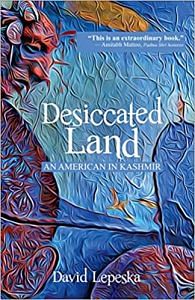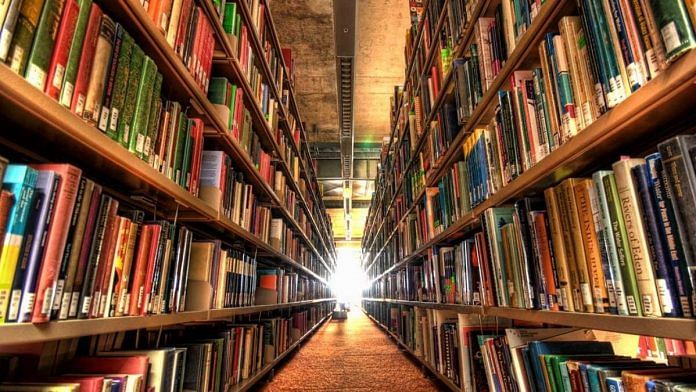Kashmiris Close the Book
Kashmir Observer report
November 12, 2006
A two-meter by two-meter slab of pearly white stucco stands alone near the center of a vacant, trash-strewn lot behind a red brick wall across Maulana Azad Road from Regal Chowk. The faux Spanish tile roofing is cracked and falling off, and on one side a golden inscription in black marble reads: “Sri Pratap Singh Library, Foundation Stone, Laid February 27, 2004.”
Zahida Bano, Chief Librarian of the current SPS Library, explained what happened.
“Nothing,” she deadpanned, chatting outside her office last week. “There was some controversy between the builders and the government, apparently costs were higher than they expected, and construction stopped before it started.”
Nearly three years later the stout monument looms over the vast emptiness like an anti-scarecrow, fending off progress and fostering a return to nature. Instead of thrumming with the quest for knowledge the spot festers, silent testament, if any more were needed, to the Valley’s intellectual calcification.
“I’ve been championing, fighting, writing letters and pleading with all and sundry, but nothing is getting done over there,” said Agha Ashraf Ali, former J&K Director of Education and Principal of the College of Education. He had prodded local bureaucrats, politicians, and businessmen not only to restart work on the modern SPS venue but also to add an extension to the children’s library in the name of his son, the poet Agha Shahid Ali, all to no avail. “Full of large promises and small excuses, they are not interested in books at all,” he said.
In the age of bottomless broadband Internet and 2000-channel satellite television, reading may be on the wane across the globe. But in Kashmir the problem is especially acute, and the stakes particularly high. From Mughals to Dogras to Indians, Kashmiris have for centuries been under one or another oppressive yoke; an unwillingness to read could fate them to remain there.
“Without a library there’s no university, there’s no thought, there’s no progress,” Agha added. “Libraries and-universities, these things are on the frontier of thought, where you can move forward and ask inconvenient questions; this is an absolutely dead society, afraid of asking questions.”
Indeed, the saddest truth may not be that the library has not yet been built, but that locals don’t seem to care. The Deputy Director of Libraries admitted the situation had grown dire.
“Many people are less interested in reading,” acknowledged Kuldeep Singh, who was transferred into his new post from the Social Welfare Department last month. He cited electronic media and an increasing lack of time, particularly among wealthier, more sophisticated Kashmiris. “The educated people are reading less, not more, even though it should be the other way around.”
Comparing the latest borrowing estimates with historical data revealed a steep decline. The Directorate of Libraries said SPS Library has averaged 1000 visitors and 350-400 borrowers per month this year. Bano, who works at the site every day, estimated that members borrowed around 70-80 books monthly, or one-fifth the directorate’s estimate.
According to Dr. Sangita Gupta and Dr. Gurdev Singh, professors of library science at the University of Jammu and authors of the new report “Public Library System in J&K State”, SPS Library loaned out 10,185 books from April 1945 to April 1946. Stretched over a year, the directorate’s 2006 estimate would come to much less than half that and Bano’s on-site numbers would be just under one-tenth. Yet the population of Srinagar has doubled in the last 60 years, which means book borrowing has dropped as much as 95 percent in that span.
Prodded by such data, Kashmir Observer undertook an informal survey of passersby on Residency Road and found that about one out of every ten local adults had read an entire book in the last six months. Unemployed engineering graduate Javed Dhar, 27, was representative of those polled.
“I’m online all the time and just not very interested in reading,” he said, stopping on the way to meet a friend for lunch. “I’m really busy, too busy…and in terms of books these days. I have no idea which ones would be good.”
Detailing a litany of problems in the J&K library system, Gupta and Singh argue that locals should not shoulder all of the blame.
“The collection developed in the public libraries so far is… not relevant to the tastes of the public.” they wrote. “[Book] selection is done at a higher level, and the requirement of users of the particular library is not taken into consideration. The librarian is not consulted…this leads to less use of library reading material.
“The condition of these libraries is unsatisfactory and very poor,” the authors continued, explaining that professional service is absent, the infrastructure nominal, the locations odd and unpopular, and that all the libraries “are lacking the requisite reading facilities; the reading space is insufficient and the requisite furniture is inadequate.”
Finally, Gupta and Singh pointed out that, like current Deputy Director Singh, most library officials are appointed from within the state administrative cadre. “In the history of public libraries, no subject expert has been appointed as Director of the Public Libraries and Research in the state,” said their report.
These findings are borne out at SPS Library, which lies tucked away behind the State Museum across from the Jhelum. Although the front reading room is bright, airy, and attractive, in two back rooms thousands of volumes fester in dusty cases surrounded by neglected, brilliantly colored papier-mache walls.
Chief Librarian Bano acknowledged the 1896 building was in need of cleaning and repair, but more than the structure has suffered. A few of the glass-fronted bookcases had been left unlocked, and a recent visitor found that many of the texts inside were fragile and of little use. Upon opening, several pages fell out of a faded, red-bound 1927 hardcover of Dostoyevsky’s Poor Folk. A bright green 1950’s Penguin Edition of Dickens’ Our Mutual Friend was sticky and unwilling.
“I used to check out Carlisle, Rousseau, the lives of Napoleon and all that from SPS, books for my father,” Agha recalled. “Now fifty, sixty years after independence, when money has been coming into Kashmir in cataracts, the library has gone to the dogs. You can’t find any books at all, anything that has been released in the last few years is not available here.”
 This excerpt from David Lepeska’s ‘Desiccated Land – An American in Kashmir’, has been published with permission from Vishwakarma Publications.
This excerpt from David Lepeska’s ‘Desiccated Land – An American in Kashmir’, has been published with permission from Vishwakarma Publications.



